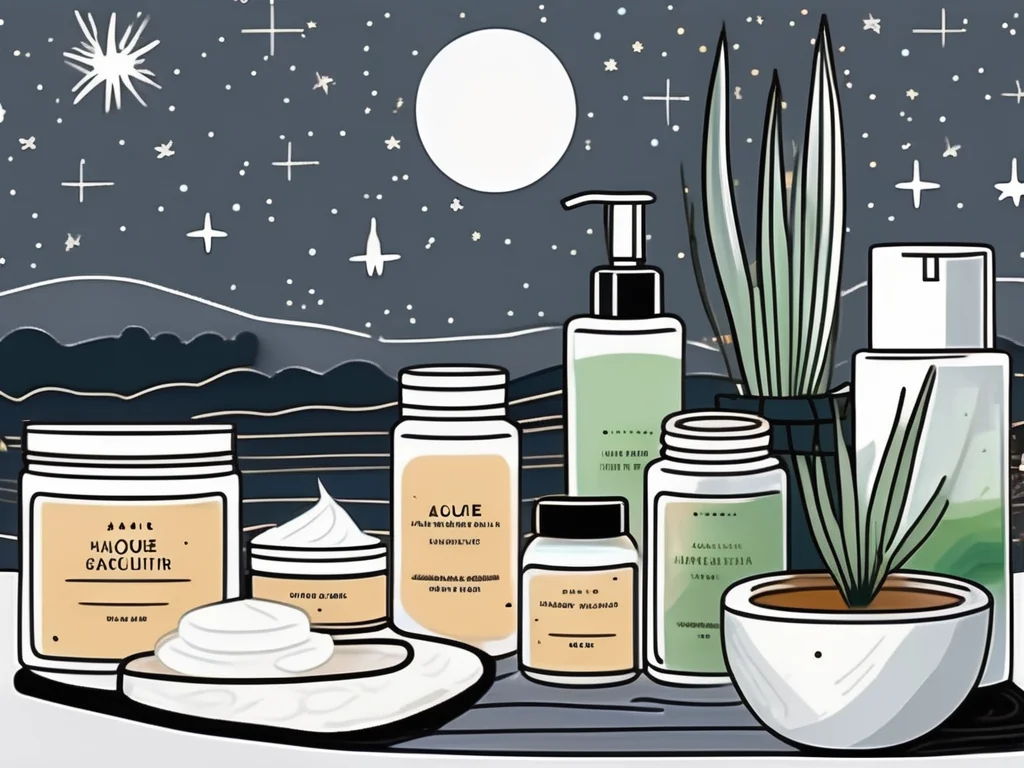Taking care of your skin at night is crucial for maintaining its health, radiance, and resilience. Nighttime is when your skin repairs and regenerates, making it the perfect time to use targeted skincare products. But with so many options available, how do you choose the right products for your specific skin type? In this guide, we’ll explore the essentials of a nighttime skincare routine, the science behind skin regeneration, and natural remedies to enhance your evening routine.
Why Nighttime Skincare Matters
Your skin works hard during the day, battling environmental stressors like pollution, UV rays, and free radicals. At night, it shifts into repair mode, producing collagen and growth hormones to rejuvenate and restore. A dedicated nighttime skincare routine ensures your skin gets the support it needs to recover, resulting in a healthier complexion and stronger skin barrier.
Key Benefits of Nighttime Skincare:
- Enhanced Repair: Nighttime is when skin cell turnover peaks, making it ideal for applying nourishing products.
- Improved Absorption: Products penetrate better at night due to increased blood flow.
- Combats Aging: Collagen-boosting ingredients like retinol can reduce fine lines and wrinkles.
By incorporating the right products, you can maximize these benefits and wake up with glowing, revitalized skin.
The Science Behind Nighttime Skin Regeneration
During sleep, your body ramps up collagen production, a protein vital for skin firmness and elasticity. Increased blood flow delivers essential nutrients to skin cells, aiding in repair and regeneration. Using products with ingredients like retinol, peptides, or hyaluronic acid can enhance this natural process, addressing concerns like aging, dryness, or uneven texture.
People Also Ask: Why is nighttime skincare important? Nighttime skincare supports your skin’s natural repair process, removes impurities, and boosts hydration, leading to a healthier, more radiant complexion by morning.
Building an Effective Nighttime Skincare Routine
A solid nighttime skincare routine revolves around three core steps: cleansing, toning, and moisturizing. Each step plays a critical role in preparing your skin for overnight repair and hydration.
Step 1: Cleansing for a Fresh Start
Cleansing removes makeup, oil, dirt, and impurities accumulated throughout the day. This step prevents clogged pores and breakouts while preparing your skin to absorb subsequent products.
- Oily/Acne-Prone Skin: Use a foaming cleanser with salicylic acid to control excess oil and prevent acne.
- Dry/Sensitive Skin: Opt for a hydrating cleanser with ingredients like glycerin or ceramides to retain moisture.
- How to Cleanse: Massage the cleanser in circular motions for 30–60 seconds, then rinse with lukewarm water to avoid stripping natural oils.
Pro Tip: Double cleansing (using an oil-based cleanser followed by a water-based one) is ideal for removing heavy makeup or sunscreen.
People Also Ask: What type of cleanser is best for nighttime skincare? Choose a cleanser based on your skin type—foaming for oily skin, cream-based for dry skin, or gentle formulas for sensitive skin.
Step 2: Toning to Balance and Prep
Toners restore your skin’s pH balance, remove residual cleanser, and prepare your skin for serums or moisturizers. They also deliver targeted ingredients to address specific concerns.
- Acne-Prone Skin: Look for toners with tea tree oil or witch hazel to reduce oil and soothe inflammation.
- Dry Skin: Choose a hydrating toner with hyaluronic acid or rosewater to boost moisture.
- Application Tip: Apply toner with a cotton pad or clean hands, gently patting it into your skin.
DIY Option: Mix one part apple cider vinegar with two parts water for a natural toner that balances pH and reduces oil.
People Also Ask: Do I need a toner in my nighttime routine? Yes, toners help balance your skin’s pH, remove leftover residue, and enhance the absorption of other products.
Step 3: Moisturizing for Overnight Hydration
Moisturizing locks in hydration and strengthens your skin’s barrier, preventing moisture loss while you sleep. The right moisturizer depends on your skin type and concerns.
- Combination Skin: Use a lightweight gel moisturizer to hydrate without clogging pores.
- Mature Skin: Opt for a richer cream with anti-aging ingredients like retinol or peptides.
- Application Tip: Massage moisturizer in upward motions to promote circulation and even application.
Key Ingredients: Look for hyaluronic acid, ceramides, or niacinamide to hydrate and repair.
People Also Ask: What’s the best moisturizer for nighttime use? Choose a moisturizer tailored to your skin type—gel-based for oily skin, cream-based for dry or mature skin, or lightweight lotions for combination skin.
Natural Nighttime Skincare Remedies
Home remedies can be a cost-effective, chemical-free way to enhance your nighttime routine. Here are some simple, natural options to try:
Natural Cleansers for Healthy Skin
- Yogurt and Honey Cleanser:
- Benefits: Yogurt’s lactic acid exfoliates gently, while honey’s antibacterial properties fight acne.
- How to Use: Mix equal parts yogurt and honey, apply to your face, and rinse after 10–15 minutes.
- Oatmeal Cleanser:
- Benefits: Soothes irritated skin and gently exfoliates.
- How to Use: Mix ground oatmeal with water to form a paste, massage onto your face, and rinse with lukewarm water.
People Also Ask: Can I use natural cleansers for sensitive skin? Yes, natural cleansers like oatmeal or honey-based mixtures are gentle and suitable for sensitive skin, but always patch-test first.
DIY Toners for Balanced Skin
- Apple Cider Vinegar Toner:
- Benefits: Balances pH and reduces excess oil.
- How to Use: Dilute one part apple cider vinegar with two parts water, apply with a cotton pad, and avoid the eye area.
- Green Tea Toner:
- Benefits: Rich in antioxidants, it calms inflammation and refreshes skin.
- How to Use: Brew and cool green tea, then apply with a cotton ball.
Pro Tip: Store DIY toners in the fridge for up to a week to maintain freshness.
People Also Ask: Are DIY toners effective for skincare? Yes, DIY toners like green tea or apple cider vinegar can balance pH and address specific skin concerns, but ensure proper dilution to avoid irritation.
Homemade Moisturizers for Overnight Hydration
- Aloe Vera Gel:
- Benefits: Soothes and hydrates all skin types.
- How to Use: Extract fresh aloe vera gel, apply to your face, and leave on overnight.
- Coconut Oil:
- Benefits: Rich in fatty acids, it deeply nourishes and moisturizes.
- How to Use: Warm a small amount in your palms, massage onto your face, and leave on overnight.
Caution: Coconut oil may clog pores for oily or acne-prone skin, so use sparingly or opt for aloe vera.
People Also Ask: Is coconut oil safe for nighttime moisturizing? Coconut oil is effective for dry or normal skin but may be too heavy for oily or acne-prone skin. Patch-test to ensure compatibility.
Safety Tips for Using Home Remedies
While natural remedies are often gentle, they require careful use to avoid irritation or allergic reactions.
Know Your Skin Type
Understanding whether your skin is oily, dry, combination, or sensitive is crucial for selecting the right products or remedies. For example, oily skin benefits from lightweight, oil-controlling products, while dry skin needs rich, hydrating formulas.
Test for Allergic Reactions
Always perform a patch test before applying a new remedy to your face. Apply a small amount to your inner wrist or behind your ear and wait 24 hours. If redness, itching, or irritation occurs, avoid using the product.
When to Seek Professional Advice
If you experience persistent acne, severe irritation, or unusual skin reactions, consult a dermatologist. Home remedies may not address underlying conditions like hormonal imbalances or chronic skin issues.
People Also Ask: Are home remedies safe for all skin types? Home remedies can be safe if tailored to your skin type and patch-tested, but consult a dermatologist for severe or persistent skin concerns.
Additional Tips for Nighttime Skincare Success
- Incorporate Serums or Masks: Use targeted treatments like vitamin C serums for brightening or overnight masks for extra hydration.
- Avoid Harsh Ingredients: Skip exfoliants or strong actives like retinoids if your skin is sensitive or irritated.
- Stay Consistent: A regular nighttime routine yields the best results over time.
- Protect Your Pillowcase: Use a silk or satin pillowcase to reduce friction and prevent moisture loss.
Conclusion
Choosing the right nighttime skincare products for your skin type can transform your complexion, leaving it radiant and healthy. By understanding your skin’s needs, incorporating a consistent routine of cleansing, toning, and moisturizing, and exploring natural remedies, you can enhance your skin’s repair process while you sleep. Always prioritize safety by testing new products and seeking professional advice when needed. With the right approach, your nighttime skincare routine will become a powerful tool for achieving glowing, rejuvenated skin.



